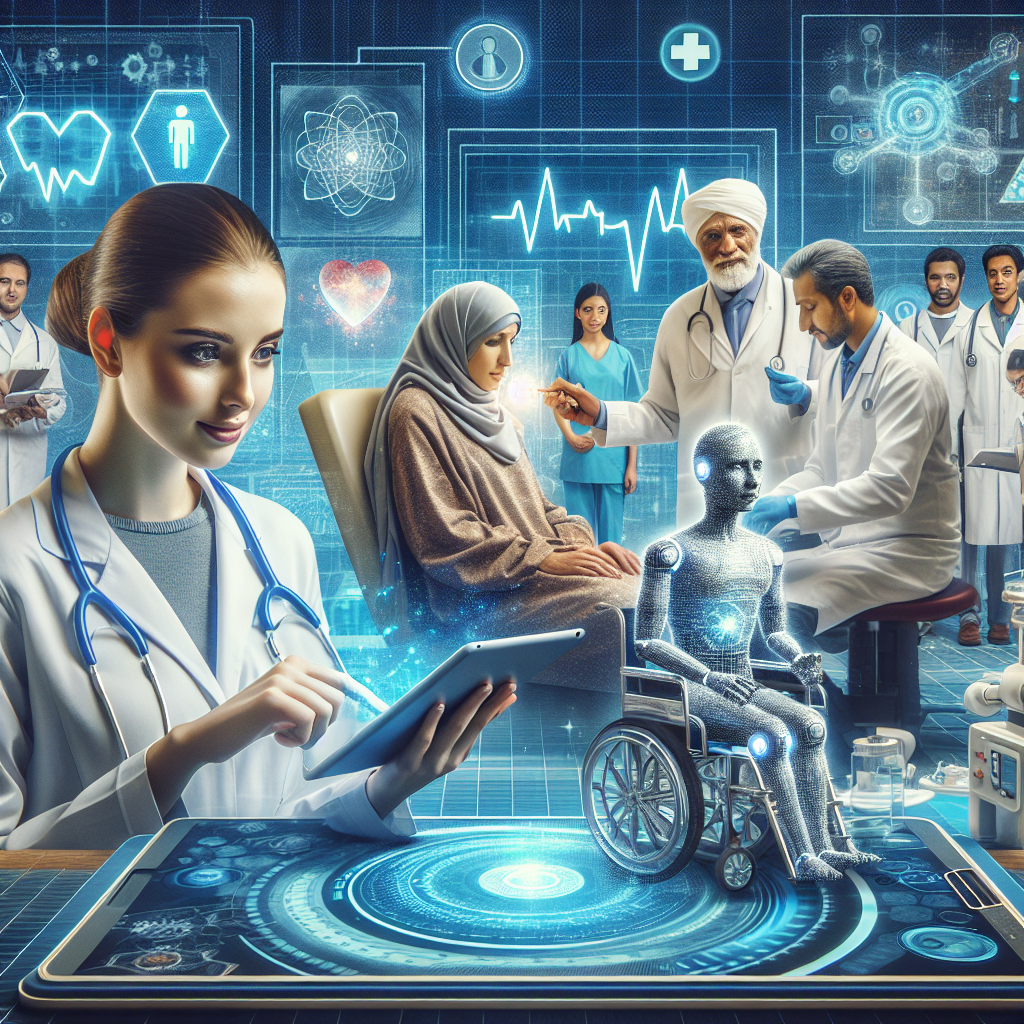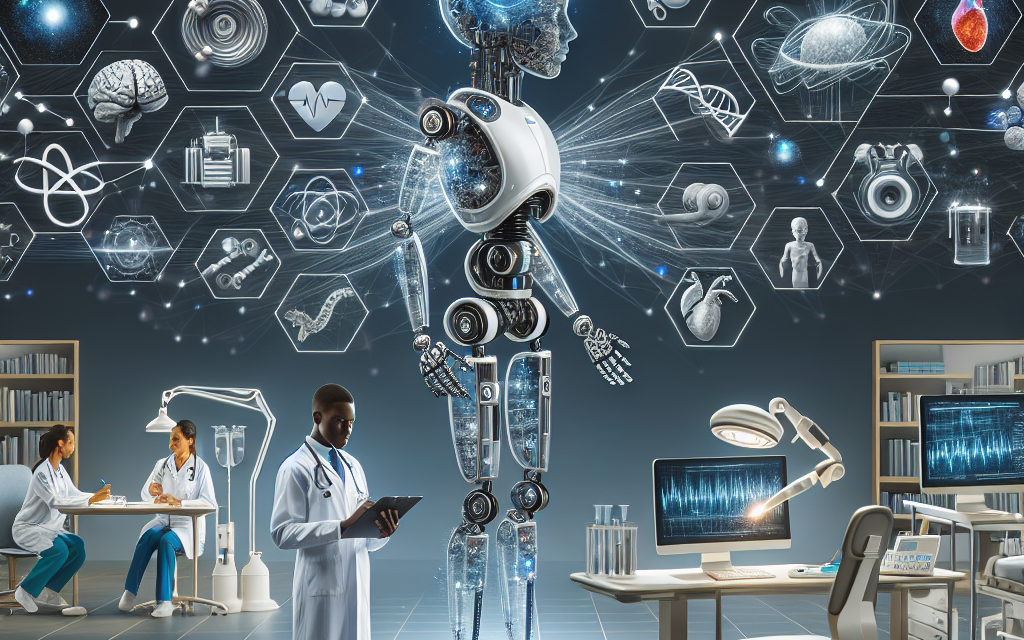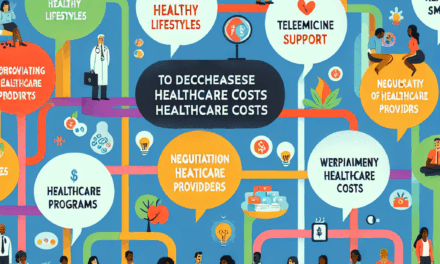Embrace AI: Revolutionizing Healthcare Transformation

The integration of Artificial Intelligence (AI) into healthcare is not just a trend; it is a revolution that is transforming the way healthcare is delivered, managed, and experienced. From predictive analytics to personalized medicine, AI is reshaping the landscape of healthcare, offering unprecedented opportunities for improving patient outcomes, reducing costs, and enhancing the efficiency of healthcare systems. This article delves into the multifaceted impact of AI on healthcare, exploring its potential, challenges, and future directions.
1. AI in Diagnostics: Enhancing Accuracy and Speed
One of the most significant contributions of AI in healthcare is in the field of diagnostics. AI algorithms, particularly those based on machine learning and deep learning, have shown remarkable capabilities in analyzing medical images and identifying patterns that are often imperceptible to the human eye.
1.1 Revolutionizing Radiology
Radiology is one of the areas where AI has made a profound impact. AI-powered tools can analyze X-rays, CT scans, and MRIs with a level of precision that rivals or even surpasses human radiologists. For instance, a study published in Nature in 2020 demonstrated that an AI system developed by Google Health outperformed radiologists in detecting breast cancer from mammograms.
These AI systems are trained on vast datasets, allowing them to recognize subtle anomalies and variations that might be missed by human practitioners. This capability not only enhances diagnostic accuracy but also significantly reduces the time required to interpret medical images, enabling faster decision-making and treatment initiation.
1.2 Pathology and Beyond
Beyond radiology, AI is also making strides in pathology. AI algorithms can analyze tissue samples and identify cancerous cells with high accuracy. For example, PathAI, a company specializing in AI-driven pathology, has developed systems that assist pathologists in diagnosing diseases more accurately and efficiently.
Moreover, AI is being used to predict disease progression and patient outcomes by analyzing a combination of imaging data, genetic information, and clinical records. This predictive capability is invaluable in tailoring treatment plans to individual patients, thereby enhancing the effectiveness of interventions.
1.3 Case Study: AI in Ophthalmology
A notable example of AI in diagnostics is its application in ophthalmology. Google’s DeepMind developed an AI system capable of diagnosing over 50 eye diseases with an accuracy comparable to that of expert ophthalmologists. This system analyzes optical coherence tomography (OCT) scans, which are complex and require specialized expertise to interpret.
The implementation of such AI systems in clinical settings can significantly reduce the burden on healthcare professionals, allowing them to focus on more complex cases and patient care. Additionally, it can improve access to quality eye care in regions with limited specialist availability.
1.4 Challenges and Considerations
Despite the promising advancements, the integration of AI in diagnostics is not without challenges. One major concern is the need for large, high-quality datasets to train AI models. Ensuring data privacy and security is paramount, as is addressing potential biases in AI algorithms that could lead to disparities in healthcare outcomes.
Furthermore, the adoption of AI in clinical practice requires careful consideration of regulatory and ethical issues. Ensuring that AI systems are transparent, explainable, and accountable is crucial to gaining the trust of both healthcare professionals and patients.
1.5 Future Directions
The future of AI in diagnostics is promising, with ongoing research focused on improving the interpretability of AI models and integrating them seamlessly into clinical workflows. As AI technology continues to evolve, it is expected to play an increasingly central role in diagnostics, ultimately leading to more accurate, efficient, and personalized healthcare.
2. AI in Personalized Medicine: Tailoring Treatment to Individuals
Personalized medicine, also known as precision medicine, is an approach that considers individual variability in genes, environment, and lifestyle to tailor medical treatment to each patient. AI is a key enabler of personalized medicine, offering tools and techniques to analyze complex datasets and derive actionable insights.
2.1 Genomic Analysis and AI
AI is revolutionizing genomic analysis by enabling the rapid interpretation of vast amounts of genetic data. Machine learning algorithms can identify genetic variants associated with diseases, predict patient responses to specific treatments, and even suggest potential therapeutic targets.
For instance, AI-driven platforms like IBM Watson for Genomics analyze genomic data to provide oncologists with evidence-based treatment recommendations for cancer patients. By considering the unique genetic makeup of each patient, these systems help in selecting the most effective therapies, thereby improving treatment outcomes.
2.2 Drug Discovery and Development
AI is also transforming the drug discovery and development process. Traditional drug discovery is time-consuming and costly, often taking over a decade and billions of dollars to bring a new drug to market. AI accelerates this process by identifying potential drug candidates, predicting their efficacy and safety, and optimizing clinical trial designs.
For example, Insilico Medicine, a biotechnology company, uses AI to identify novel drug targets and design new molecules. In 2020, the company announced the discovery of a new drug candidate for idiopathic pulmonary fibrosis, developed in just 18 months—a fraction of the time typically required.
2.3 Case Study: AI in Oncology
Oncology is a field where personalized medicine has shown significant promise. AI systems analyze a combination of genomic data, clinical records, and treatment outcomes to develop personalized treatment plans for cancer patients. This approach not only improves the effectiveness of therapies but also minimizes adverse effects.
For instance, Tempus, a technology company specializing in precision medicine, uses AI to analyze clinical and molecular data to provide oncologists with insights into the most effective treatment options for their patients. This data-driven approach has been instrumental in advancing personalized cancer care.
2.4 Challenges and Ethical Considerations
While AI holds great potential in personalized medicine, it also presents challenges. Ensuring the accuracy and reliability of AI-driven insights is critical, as is addressing issues related to data privacy and consent. Additionally, there is a need to ensure that AI systems are accessible and equitable, preventing disparities in healthcare access and outcomes.
Ethical considerations are also paramount, particularly in the context of genetic data. Ensuring that patients understand how their data is used and have control over its use is essential to maintaining trust in AI-driven personalized medicine.
2.5 Future Directions
The future of AI in personalized medicine is bright, with ongoing research focused on integrating multi-omics data (genomics, proteomics, metabolomics) to provide a more comprehensive understanding of disease mechanisms. As AI technology continues to advance, it is expected to play an increasingly central role in delivering personalized, effective, and equitable healthcare.
3. AI in Healthcare Operations: Streamlining Efficiency
Beyond diagnostics and personalized medicine, AI is also transforming healthcare operations, enhancing efficiency, reducing costs, and improving patient experiences. From optimizing hospital workflows to managing supply chains, AI is reshaping the way healthcare organizations operate.
3.1 Optimizing Hospital Workflows
AI is being used to optimize hospital workflows by predicting patient admissions, discharges, and bed occupancy rates. Machine learning algorithms analyze historical data to forecast patient flow, enabling hospitals to allocate resources more effectively and reduce wait times.
For example, the Cleveland Clinic has implemented an AI-driven system that predicts patient admissions and discharges, allowing for better resource allocation and improved patient care. This system has helped reduce patient wait times and improve overall hospital efficiency.
3.2 Enhancing Supply Chain Management
AI is also transforming supply chain management in healthcare. By analyzing data on inventory levels, demand patterns, and supplier performance, AI systems can optimize procurement processes, reduce waste, and ensure the timely availability of critical supplies.
For instance, Northwell Health, a healthcare provider in New York, uses AI to manage its supply chain, resulting in significant cost savings and improved efficiency. The system predicts demand for medical supplies and optimizes inventory levels, ensuring that essential items are always available when needed.
3.3 Case Study: AI in Telemedicine
The COVID-19 pandemic has accelerated the adoption of telemedicine, and AI is playing a crucial role in enhancing virtual care delivery. AI-powered chatbots and virtual assistants are being used to triage patients, schedule appointments, and provide health information, reducing the burden on healthcare professionals.
For example, Babylon Health, a digital health company, uses AI to provide virtual consultations and health assessments. The AI system analyzes patient symptoms and medical history to offer personalized health advice and recommendations, improving access to care and patient satisfaction.
3.4 Challenges and Considerations
While AI offers significant benefits in healthcare operations, it also presents challenges. Ensuring the accuracy and reliability of AI-driven insights is critical, as errors can have serious consequences for patient care. Additionally, there is a need to address issues related to data privacy and security, particularly in the context of telemedicine.
Furthermore, the integration of AI into healthcare operations requires careful consideration of regulatory and ethical issues. Ensuring that AI systems are transparent, explainable, and accountable is crucial to gaining the trust of both healthcare professionals and patients.
3.5 Future Directions
The future of AI in healthcare operations is promising, with ongoing research focused on improving the interpretability of AI models and integrating them seamlessly into clinical workflows. As AI technology continues to evolve, it is expected to play an increasingly central role in streamlining healthcare operations, ultimately leading to more efficient, cost-effective, and patient-centered care.
4. AI in Patient Engagement: Empowering Patients
AI is not only transforming healthcare delivery but also empowering patients to take an active role in managing their health. From personalized health recommendations to virtual health assistants, AI is enhancing patient engagement and improving health outcomes.
4.1 Personalized Health Recommendations
AI-powered platforms are providing patients with personalized health recommendations based on their individual health data, lifestyle, and preferences. These platforms analyze data from wearable devices, electronic health records, and other sources to offer tailored advice on diet, exercise, medication adherence, and more.
For example, HealthifyMe, a digital health and wellness platform, uses AI to provide personalized diet and fitness recommendations. The platform analyzes user data to offer customized meal plans, workout routines, and health tips, helping users achieve their health goals.
4.2 Virtual Health Assistants
Virtual health assistants powered by AI are becoming increasingly popular, offering patients convenient access to health information and support. These assistants can answer health-related questions, schedule appointments, and provide medication reminders, enhancing patient engagement and satisfaction.
For instance, Ada Health, a health technology company, offers an AI-powered health assistant that provides users with personalized health assessments and recommendations. The assistant analyzes user symptoms and medical history to offer tailored advice, empowering patients to make informed health decisions.
4.3 Case Study: AI in Chronic Disease Management
AI is playing a crucial role in chronic disease management by providing patients with tools to monitor their health and manage their conditions effectively. AI-powered platforms offer personalized insights and recommendations, helping patients track their symptoms, medication adherence, and lifestyle changes.
For example, Livongo, a digital health company, uses AI to support patients with chronic conditions such as diabetes and hypertension. The platform provides personalized insights and recommendations based on real-time data from connected devices, empowering patients to take control of their health.
4.4 Challenges and Considerations
While AI offers significant benefits in patient engagement, it also presents challenges. Ensuring the accuracy and reliability of AI-driven insights is critical, as errors can have serious consequences for patient health. Additionally, there is a need to address issues related to data privacy and security, particularly in the context of personal health data.
Furthermore, the integration of AI into patient engagement requires careful consideration of regulatory and ethical issues. Ensuring that AI systems are transparent, explainable, and accountable is crucial to gaining the trust of both patients and healthcare professionals.
4.5 Future Directions
The future of AI in patient engagement is promising, with ongoing research focused on improving the interpretability of AI models and integrating them seamlessly into patient care. As AI technology continues to evolve, it is expected to play an increasingly central role in empowering patients to take an active role in managing their health, ultimately leading to improved health outcomes and patient satisfaction.
5. AI in Healthcare Research: Accelerating Innovation
AI is not only transforming healthcare delivery but also accelerating innovation in healthcare research. From drug discovery to clinical trials, AI is reshaping the way research is conducted, offering new opportunities for advancing medical knowledge and improving patient care.
5.1 Accelerating Drug Discovery
AI is revolutionizing drug discovery by enabling the rapid identification of potential drug candidates and predicting their efficacy and safety. Machine learning algorithms analyze vast amounts of data from scientific literature, clinical trials, and molecular databases to identify promising compounds and optimize drug design.
For example, BenevolentAI, a biotechnology company, uses AI to accelerate drug discovery and development. The company’s AI platform analyzes scientific data to identify novel drug targets and design new molecules, significantly reducing the time and cost of bringing new drugs to market.
5.2 Optimizing Clinical Trials
AI is also transforming clinical trials by optimizing trial design, patient recruitment, and data analysis. Machine learning algorithms analyze historical trial data to identify optimal trial designs and predict patient responses, improving the efficiency and success rate of clinical trials.
For instance, Unlearn.AI, a technology company specializing in clinical trial optimization, uses AI to create digital twins of patients, allowing researchers to simulate trial outcomes and optimize trial designs. This approach has been shown to reduce trial timelines and improve the accuracy of trial results.
5.3 Case Study: AI in Rare Disease Research
AI is playing a crucial role in rare disease research by analyzing complex datasets to identify disease mechanisms and potential therapeutic targets. AI-driven platforms offer new opportunities for advancing our understanding of rare diseases and developing targeted therapies.
For example, Healx, a biotechnology company, uses AI to accelerate the discovery of treatments for rare diseases. The company’s AI platform analyzes scientific data to identify potential drug candidates and predict their efficacy, significantly reducing the time and cost of developing new treatments.
5.4 Challenges and Considerations
While AI offers significant benefits in healthcare research, it also presents challenges. Ensuring the accuracy and reliability of AI-driven insights is critical, as errors can have serious consequences for research outcomes. Additionally, there is a need to address issues related to data privacy and security, particularly in the context of sensitive research data.
Furthermore, the integration of AI into healthcare research requires careful consideration of regulatory and ethical issues. Ensuring that AI systems are transparent, explainable, and accountable is crucial to gaining the trust of researchers and stakeholders.
5.5 Future Directions
The future of AI in healthcare research is promising, with ongoing research focused on improving the interpretability of AI models and integrating them seamlessly into research workflows. As AI technology continues to evolve, it is expected to play an increasingly central role in accelerating innovation in healthcare research, ultimately leading to new discoveries and improved patient care.
Conclusion
The integration of AI into healthcare is revolutionizing the way healthcare is delivered, managed, and experienced. From enhancing diagnostic accuracy to personalizing treatment plans, optimizing healthcare operations, empowering patients, and accelerating research, AI is reshaping the landscape of healthcare. While challenges remain, the potential benefits of AI in healthcare are immense, offering new opportunities for improving patient outcomes, reducing costs, and enhancing the efficiency of healthcare systems. As AI technology continues to evolve, it is expected to play an increasingly central role in transforming healthcare, ultimately leading to a more effective, equitable, and patient-centered healthcare system.





